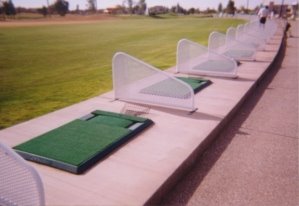 Not knowing any better, I believed that they were just as good as the real thing. Boy was I wrong. Indeed, I became pretty proficient hitting golf balls off padded Astro Turf. But that's a lot like saying you can fly a plane well after only piloting a video flight simulator.
Not knowing any better, I believed that they were just as good as the real thing. Boy was I wrong. Indeed, I became pretty proficient hitting golf balls off padded Astro Turf. But that's a lot like saying you can fly a plane well after only piloting a video flight simulator.While hitting a teed ball off range mats doesn't pose a problem, hitting unteed balls off range mats can adversely affect your swing. The main problem with range mats is that they don't allow you to take divots. When an iron impacts real grass, it digs in and scoops out a chunk of turf leaving the so-called divot. When this happens in relation to contact with the golf ball is all the difference with iron ball-striking. When hit properly, the iron contacts the ball before it impacts with the turf. If the iron hits the turf before the ball, the turf will interfere with the iron on ball contact resulting in the so-called "fat" shot. Besides the dreaded shank, the fat shot is the ugliest shot in golf. Laying sod is for landscaping your yard, not for hitting a golf ball.
Practicing on real turf gives you the necessary feedback to learn proper iron ball-striking. Hit a fat shot on real turf, and the ball behaves just like it does on the golf course - it goes nowhere. The beauty is knowing that you must have done something incorrectly to produce such a poor result. However, a fat shot on a range mat will likely produce a somewhat acceptable result. How do you improve if you don't know when you are doing something wrong?
Another problem with range mats is that they are unyielding to the impact from a properly struck iron. As a result, golfers may try to minimize contact with the mat, adversely affecting their swing. I certainly felt that extensive practice on range mats caused me to develop an overly shallow swing and become a "picker" of the golf ball. In other words, I was hitting the golf ball without taking a divot whatsoever.
While I don't think that there's anything significantly wrong with being a "picker", the margin for error is much less for a picker. Strike the ball one or two grooves lower than normal on the clubface, and a picker will hit it thin. A steeper swing will forgive such faults.
Lastly, the firmness of mats may actually start to alter your clubs! If you have soft, forged irons, the constant pounding against a range mat could bend the club's lie angle. Be sure to have the lie angles of your forged irons checked if you've been hitting off a mat.
Thankfully my local course now has a full-time 100% real grass driving range. I realize that my extensive practice on range mats was not only largely fruitless, but also detrimental. I now refuse to practice on range mats, using them only to warm-up before a round in the absence of a grass range. As Cheech and Chong might say, "there's just no substitute for real grass."
Labels: Equipment, Swing Tips




